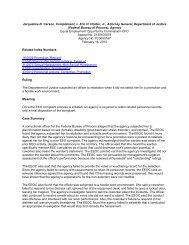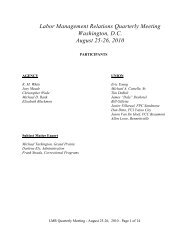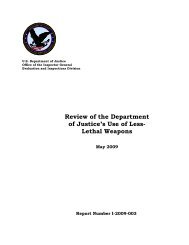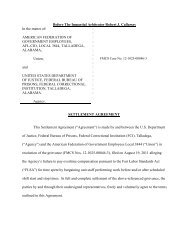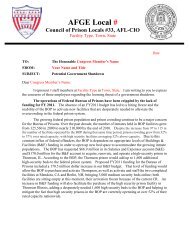leave scheduling/ sheridan - Council of Prison Locals - C-33
leave scheduling/ sheridan - Council of Prison Locals - C-33
leave scheduling/ sheridan - Council of Prison Locals - C-33
Create successful ePaper yourself
Turn your PDF publications into a flip-book with our unique Google optimized e-Paper software.
BEFORE MARTIN HENNER<br />
ARBITHATOH<br />
IN THE MATTER OF AN ARBITRATION BETWEEN<br />
COUNCIL OF PRISON LOCALS<br />
THE AMERICAN FEDERATION OF GOVERNMENT<br />
EMPLOYEES, LOCAL No. 3979<br />
and<br />
U.S. DEPARTMENT OF JUSTICE, FEDERAL<br />
BUREAU OF PRISONS, FEDERAL CORRECTIONAL<br />
INSTITUTION at SHERIDAN. OREGON<br />
)<br />
)<br />
)<br />
I<br />
t<br />
FMCS No.09-53111<br />
OPINION<br />
and<br />
AWARD<br />
DANNY PAYNE<br />
LEAVE SCHEDULING<br />
GRIEVANCE<br />
REPRESENTING THE UNION:<br />
RANDALL BOEGER<br />
UNION REPRESENTATIVE<br />
AFGE LOCAL 3979<br />
COUNCIL OF PRISON LOCALS<br />
REPRESENTING THE AGENCY:<br />
MICHAEL MARKIEWICZ<br />
AGENCY REFRESENTATIVE<br />
U.S DEPARTMENT OF JUSTICE<br />
BUREAU OF PRISONS<br />
HEARING HELD ON:<br />
AT<br />
NOVEMBER 1B,2OO9<br />
SHERIDAN, OREGON<br />
DATE OF AWARD<br />
MARCH 11,2010<br />
AFGE 39/9 - BUREAU OF PRISONS-SHERtDAN (Leave Scheduting) Page 1 oI 14
INTRODUCTION<br />
This arbitration arises out <strong>of</strong> a grievance filed by the <strong>Council</strong> o{ <strong>Prison</strong> <strong>Locals</strong>,<br />
American Federation <strong>of</strong> Government Employees, Local 3g7g (Union), againsr the<br />
Unlted States Department <strong>of</strong> Justice. Bureau <strong>of</strong> <strong>Prison</strong>s, Federal Correctional Institution<br />
Sheridan. oregon (Agency). The grievance wasfiled on behalf <strong>of</strong> Danny payne,<br />
President <strong>of</strong> the Unton (Grievant). on behalf <strong>of</strong> all bargaining unit members atfected by<br />
the restrictions<br />
<strong>leave</strong> <strong>scheduling</strong> imposed by the Agency.<br />
The Union asserled that the Department had violated the pafties' Master<br />
Agreement (Agreement) when rt revised its <strong>leave</strong> policy for staff rn rts unit management<br />
ICAMS,<br />
Specifically the <strong>leave</strong> policy governing unit management stall (counselors, case<br />
managers and the unit clerk/secretary) had formerly permitted two employees to<br />
schedule <strong>leave</strong> at any one time in each housing unit (or three employees at the Satellite<br />
<strong>Prison</strong> camp, sPC). The Agency had now adopted a new policy which limited<br />
scheduled <strong>leave</strong> to only one member <strong>of</strong> a unit team at a time (or two at SPC). Briefly, in<br />
prior years. two <strong>leave</strong> slots were allowed, but now that was reduced to a single slot.<br />
The Union asserted that such a change in a long standing <strong>leave</strong> policy violated<br />
the Agreement and the Local SupplementalAgreement, in that the change was effected<br />
without consultation with the Union and was arbitrarily made, without a justification for<br />
such a change based on needs <strong>of</strong> safety. security or mission accomplishments.<br />
The Unton further asserted that the real reason for the Agency's change in <strong>leave</strong><br />
policy was retaliation lt was intended to punish the Union for having pursued a prior<br />
AFGE 3979 - BUREAU OF PRTSONS-SHERIDAN (Leave Scheduting) Page 2al 14
grievance, which had alleged improper application o{ the Agency's <strong>leave</strong> practtces, to<br />
arbitration. The Unron won that arbitration, forcing the Agency to modify its practices.<br />
When the pafties were unable to come to a satisfactory resolution <strong>of</strong> the<br />
grlevance, they proceeded to arbitration before the undersigned, who was selected from<br />
a panel f urnished by the U.S. Federal Mediation and Conciliation Service. The matter<br />
was heard on November 18, 2009, at the Personnel Conference Traininq Room.<br />
Federal Correctional Institution, Sheridan, Oregon.<br />
During the hearing, the parties stipulated that the matter was properly before the<br />
arbitrator, and all procedural prerequisites had been complied with.<br />
The parties agreed that written briefs would be filed subsequently by the parties<br />
wtth a postmark deadline <strong>of</strong> January B, 2O10 Both briefs were properly postmarked<br />
The last brief , sent f rom Arizona, was received by the arbitrator on January i 4. 2010, at<br />
which trme the record was closed and the matter submitted for decision<br />
The Union was represented by Randall Boeger. Union Representative forAFGE<br />
Local 3979. and the Employer by Michael Markiewicz, Agency Representative, U.S<br />
Depafiment <strong>of</strong> Justice/Bureau <strong>of</strong> <strong>Prison</strong>s.<br />
Both parties were afforded a full opportunity to <strong>of</strong>fer written evidence, examrne<br />
and cross examine witnesses, and submit arguments in support <strong>of</strong> their posrtions.<br />
ISSUES<br />
Did the Agency violate the Agreement when it reduced the avaitabte slots for<br />
scheduled <strong>leave</strong> for bargarning unit ernployees in Unit Management<br />
AFGE 3979 - BUFEAti oF pRrsoNs-SHERTDAN (Leave scheduring) Page 3ol 14
R ELEVANT CONTRACT LANGUAGE<br />
MASTER AGREEMENT<br />
Federal Bureau <strong>of</strong> Prrsons and <strong>Council</strong> <strong>of</strong> prison <strong>Locals</strong><br />
ARTICLE 6 - RIGHTS OF THE EMPLOYEE<br />
Sectton b The parties agree that there will be no restraint harassment, intimidation,<br />
reprtsal, or any coerclon against any employee in the exercise <strong>of</strong> any employee<br />
rtghts provtded lor in this. Agreement and any other applicable laws, rules and<br />
regulations....<br />
ARTICLE 19 - ANNUAL LEAVE<br />
Section a. The Employer and the Union agree that annuai <strong>leave</strong> rs the right <strong>of</strong> the<br />
employee and not a privilege, and should be used by employees All employees<br />
wtll be allowed utilization <strong>of</strong> their annual <strong>leave</strong> at least to the exteni that annual<br />
<strong>leave</strong> carry-over will not exceed the statutory limitation lor each individual. Any<br />
employee who wishes to accumulate up to the maximum, statutory carry-over will<br />
be allowed to do so. Annual <strong>leave</strong> will be scheduled as requested by employees<br />
in accordance with the prrovisions <strong>of</strong> this afticle ins<strong>of</strong>ar as it does not decrease<br />
the safety, security. or n'ission accomplishments <strong>of</strong> the organization<br />
Section b All departments will use total-<strong>leave</strong> year <strong>scheduling</strong><br />
1. all departments will apply the features outlined rn Section l. o{ this articte in<br />
<strong>scheduling</strong> annual <strong>leave</strong>r for all bargaining unit employees unless mutually waived<br />
by the department head and the Union, and<br />
2. in <strong>leave</strong> <strong>scheduling</strong>, both parties agree that an employee's annual <strong>leave</strong> wtll,<br />
whenever possible and to the greatest extent possible begin on the first day <strong>of</strong><br />
thetr workweek and end on the last day <strong>of</strong> their workweek. Both parttes agree<br />
there wrll be times when this practice will not be feasible, however. the Employer<br />
will not arbitrarily deviate from the above practice.<br />
Section c Employee requests for unscheduled <strong>leave</strong> wili be handled tn accordance with<br />
applicable laws. rules, etnd regulations, including the Family and Medical Leave<br />
Act and the Famity Frienciiy Leave Act<br />
"l requests lor annual ieave. sick <strong>leave</strong>. and/or <strong>leave</strong> without pay, for the purpose.s <strong>of</strong><br />
adopting a chtld, will be handled in accordance with applicable laws. rules, and<br />
requlations.<br />
AFGF 3979 - BUBFATJ OF PRTSONS-SHER|DAN (Leave SchedLrling) Page 4oI 14
Section d. Annua<strong>leave</strong>/sick <strong>leave</strong>, whichever is appropriate, should be granted to an<br />
employee in the case o{ death in the employee's family. A family member is<br />
deflned as a spouse or Spouse's parents, son and daughter, rncluding adopted<br />
sons or daughters and their spouses. parents brothers and sisters and their<br />
spouses, and any individual related by blood or affinity whose close association<br />
is the equivalent <strong>of</strong> a family relationship. Annual <strong>leave</strong> may be granted to an<br />
employee to attend the funeral <strong>of</strong> a law enforcementlfirefighter killed in the line <strong>of</strong><br />
duty. Annua<strong>leave</strong> may be granted to an employee to attend the funeral ol a coworker.<br />
Section e. In the event <strong>of</strong> a conflict between unit members as to the chotce <strong>of</strong> vacation<br />
periods, individual seniority for each group o{ employees will be applied. Seniority<br />
in the Federal Bureau <strong>of</strong> <strong>Prison</strong>s is defined as totalength <strong>of</strong> service in the<br />
Federal Bureau <strong>of</strong> <strong>Prison</strong>s. Seniority for Public Health Service (PHS) employees<br />
will be de{ined as the entrance date lor the PHS enrployee being assigned to a<br />
Federal Bureau <strong>of</strong> <strong>Prison</strong>s facility. lt is understood that, as the Bureau <strong>of</strong> prisons<br />
absorbed the U.S. Public Health Service facilities located at Lexington, Kentucky<br />
and Forl Worth Texas, agreements were made to give those PHS staff seniority<br />
{or <strong>leave</strong> purposes based on their entire pHS career.<br />
Section f In accordance with applicable laws rules, and regulations, the Employer may<br />
grant administrative <strong>leave</strong> or other appropriate <strong>leave</strong> during emergency situations<br />
tn the local area for affected employees. These may include, but are not limited<br />
to. extreme weather conditions, serious interruptions<br />
public transportation, and<br />
dtsasters such as lire, flood, or other natural phenomena. In metropolitan areas,<br />
the heads <strong>of</strong> Federal Executive Boards are responsible for the development and<br />
dissemination ol special adverse weather <strong>leave</strong> notices and procedures for their<br />
locales ln areas not covered by Federal Executive Boards, the Chief Executive<br />
Officer will constder tnformation from local, county, andior state law enforcement<br />
<strong>of</strong>ficials, Department <strong>of</strong> Transportation <strong>of</strong>ficials, and weather services, who <strong>of</strong>ten<br />
dissemtnate information concerning hazardous traveling conditions in varrous<br />
localities. This information will be used in the decision process as to whether or<br />
not to grant appropriate forms <strong>of</strong> <strong>leave</strong>.<br />
Section g. Leave must not be denied for arbitrary or capricious reasons. Denial or<br />
cancellation <strong>of</strong> <strong>leave</strong> should be based on work-related reasons when<br />
cancellation appears to be necessary, the Employer agrees to notify the<br />
employee as far in advance as possible that his/her approved scheduled annual<br />
<strong>leave</strong> is to be canceled. The employee will be allowed to express any personal<br />
concerns. In making the decisron. the Employer will consider potential disruption<br />
to the employee's family or personalfinancial loss.<br />
Section h The Empioyerecognizes that participation in internal Union business rs a<br />
legitimate use <strong>of</strong> annual <strong>leave</strong>. The Employer will make every reasonable eff<strong>of</strong>t to<br />
grant <strong>leave</strong> to employees engaged in such activities.<br />
AFGE 3979 - BUREAU OF pRtSONS-SHER|DAN (Leave Scheduting) Page 5 <strong>of</strong> 14
Section i. Employees within the same department may request to trade approved<br />
annual <strong>leave</strong> periods. After an empioyee has been selected for transfer from his/<br />
her depafiment/tacility, such requests will not be allowed except when the<br />
employee is subject to losing annual <strong>leave</strong> at year's end. Vacated <strong>leave</strong> periods<br />
will be <strong>of</strong>fered in accordance with the provisions <strong>of</strong> this article.<br />
Section j. When annual <strong>leave</strong> periods become available by virtue <strong>of</strong> employee transfers,<br />
retirements, resignations. or other causes, these <strong>leave</strong> period(s) will be posted<br />
for interested employees in accordance with the provisions <strong>of</strong> thrs article<br />
Section k. Employees may request cancellation <strong>of</strong> scheduled annual <strong>leave</strong>. Requests<br />
for such cancellation shall be made rn writing as soon as possible<br />
Section l. Total <strong>leave</strong>-year <strong>scheduling</strong> procedures may be negotiated locally provided<br />
that:<br />
I . a <strong>leave</strong> commrttee <strong>of</strong> at least one (1) supervisor and at least one (1) Union<br />
representative the number to be negotiated locally, will be responsible for<br />
implementing the seniority requirements <strong>of</strong> this article regarding total <strong>leave</strong>-year<br />
<strong>scheduling</strong>; and<br />
2 alter considering the views and input <strong>of</strong> the Union, the Employer will determine the<br />
maxlmum number <strong>of</strong> employees that may be on scheduled annual <strong>leave</strong> during<br />
each one (1) week [seven(7) consecutive days] period, and when scheduled<br />
annual <strong>leave</strong> will be curtailed because <strong>of</strong> training and/or other causes such as<br />
military <strong>leave</strong> To the extent possible, such determination will be made and<br />
announced prror to setting up the annual <strong>leave</strong> schedule.<br />
Section m. Total <strong>leave</strong>-year <strong>scheduling</strong> does not prohibit employees from requesting<br />
<strong>leave</strong> for various lengths and reasons throughout the <strong>leave</strong> year. The Employer<br />
will consider the employee's needs for an expeditious response, and such <strong>leave</strong><br />
requests will normally be approved or denied within twenty-four (24) hours <strong>of</strong> the<br />
request.<br />
LOCAL SUPPLEM ENTAL AGR EEMENT<br />
Federal Bureau <strong>of</strong> <strong>Prison</strong>s<br />
Federal Correctional Institution, Federal Detention Center, Federal prison Camp.<br />
Sheridan, Oregon<br />
and<br />
American Federation <strong>of</strong> Government Employees Local #3979<br />
ARTICLE 19 _ ANNUAL LEAVE<br />
Section a. Leave committees will consist <strong>of</strong> one Union representative appointed by the<br />
Union Local President and one Supervtsor,<br />
equal numbers whichevers<br />
AFGE 3979 - BUREAU OF PRTSONS-SHER|DAN {Leave Scheduting) Page 6<strong>of</strong> 14
greater. This committee will be responsible for implementrng the annual <strong>leave</strong><br />
<strong>scheduling</strong>. unless waived by both parties in writing.<br />
Sectton k. Annual <strong>leave</strong> will be scheduled in accordance with the provisions <strong>of</strong> this<br />
afiicle ins<strong>of</strong>ar as it does not decrease the safety, security, or mission<br />
accomplishments <strong>of</strong> the orqanizatron.<br />
THE UNION<br />
POSITIONS OF THE PARTIES<br />
The Union claims that Agency management improperly reduced the number o{<br />
scheduled <strong>leave</strong> slots for untt management staff as retaliation againsthe Union for its<br />
acttons in taking a prior grievance concerning <strong>leave</strong> practices to arbrtratron. Prior to that<br />
first arbitration, Agency management made threats to Union <strong>of</strong>ficers that, if they pursued<br />
that case, <strong>leave</strong> practices would be changed to the detriment <strong>of</strong> bargaining unit<br />
employees<br />
The Union furlher claims that. under the Agreement, Artrcle 19, Section g, <strong>leave</strong><br />
shall not be denied for arbitrary or capricious reasons, and under the Supplemental<br />
Agreement, Article 19. Section k:<br />
Annual <strong>leave</strong> will be scheduled in accordance with the provisions <strong>of</strong> this article<br />
tns<strong>of</strong>ar as it does not decrease the safety, security, or mission accomplishments<br />
<strong>of</strong> the organizatron.<br />
Since the Agency has failed to demonstrate its need, based on safety, security or<br />
misston accomplrshments o{ the organization. the reduction in <strong>leave</strong> slots vioiates the<br />
Agreement and the Supplemental Agreement.<br />
AFGE 3979 - BUREAU OF PRTSONS-SHER|DAN (Leave Sclreduting) Page 7 ot 14
THE AGENCY<br />
The Agency denies that there was any motive <strong>of</strong> retaliation for its decision to reduce the<br />
number ol scheduled <strong>leave</strong> slots. lt was purely a decision based on the needs <strong>of</strong> the<br />
Agency.<br />
The Agency also claims that, under the Master Agreement. it is exclusively a<br />
nlanagement decision to determine the number <strong>of</strong> scheduled <strong>leave</strong> slots to schedule,<br />
subject only to a requirement to give consideration <strong>of</strong> the views and input <strong>of</strong> the Union<br />
The Agency asserts that such consideration was given.<br />
FINDINGS<br />
Rar-knrnrrnr{<br />
The Bureau ol <strong>Prison</strong>s maintains three kinds <strong>of</strong> institutions at its prison rn<br />
Sheridan, Oregon. They are the Federal Correctional Institution (FCl), Federal<br />
Detention Center (FDC), and Sateilite prison Camp (SpC)<br />
In each <strong>of</strong> these institutrons, the housing units have unit management teams,<br />
consisting <strong>of</strong> counselors, case managers, and clerks or secretaries These teams asstsr<br />
the inmates regarding their needs, complarnts, health issues, trans{ers, discharges, and<br />
general adjustment to the institution.<br />
A housing unit at FCI will typically have a team <strong>of</strong> five, consisting <strong>of</strong> two<br />
counselors, two case managers. and a clerk. Such a housing unit has two sides: "A'<br />
and '8", with a case manager and counselor assigned to each side and the clerk<br />
handling work for both.<br />
AFGE 3979 - BUREAU OF PRTSONS-SHFRIDAN {Leave Scheduling) Page 8 ol '14
In most past years (although perhaps not all). Agency management permitted up<br />
to two staff members <strong>of</strong> these teams to be away on scheduled <strong>leave</strong> at any one time<br />
Because <strong>of</strong> the chance that other team members might need to take unscheduled <strong>leave</strong><br />
due to illness or bereavement, a team might be left with only one or two team members<br />
on duty However there is no evidence that this created anv serious problems for the<br />
institution<br />
past years.<br />
In 2008 the Unton was alerted that one <strong>of</strong> the unit managers had imposed<br />
additional restrictions on the use <strong>of</strong> scheduled <strong>leave</strong> for his teams. While he would still<br />
permlt up to two team members to take scheduled <strong>leave</strong> at the same time, he prohibited<br />
both counselors or both case managers or both team members from either the "A" or B"<br />
sides from taking scheduled <strong>leave</strong> at the same time.<br />
As this appeared to conflict with the <strong>leave</strong> provisions <strong>of</strong> the Agreement as well<br />
as provistons requiring equal treatment for all employees, the Union filed a grievance,<br />
which ultlmately went to arbitration lt was heard by Arbitrator Walter Kawecki, Jr.<br />
Arbltrator Kawecki rejected the Agency's argumenthat such restrictrons were<br />
necessary to assure mission accomplishments and safety <strong>of</strong> the organization.<br />
Arbitrator Kawecki noted that all <strong>of</strong> the other housing units were able to meet with<br />
mlsslon accompltshments and safety needs withouthe imposition <strong>of</strong> these additional<br />
restrictions Thus the evrdence supported the Union's position that the <strong>leave</strong> restrictions<br />
were not necessary and were arbitrarily imposed in violation <strong>of</strong> the Agreement<br />
The Union alieges that during the processing <strong>of</strong> this grievance in 2008, Agency<br />
managernent threatened them that if they pursued the grievance to arbitration and<br />
AFGE s979 - BUREAU OF PRTSONS-SHER|DAN {Leave Scheduting) Page 9<strong>of</strong> 14
prevailed, a consequence would be a tightening up oi scheduled <strong>leave</strong> to the detriment<br />
o{ bargaining unit members.<br />
Findings - Contract Interpretation<br />
In examrning the language o1 the Master Agreement, I have come to the<br />
conclusion that the Agency's interpretation rs correct. Management has the authority to<br />
determine the number <strong>of</strong> <strong>leave</strong> slots it wishes to authorize for any week. lt is not<br />
required to justify its decision by reference to safety, security or mission<br />
accomplishments.<br />
Afticle 19, section l. subsection 2, states.<br />
after considering the views and input <strong>of</strong> the Union, the Employer will determine<br />
the maximum number <strong>of</strong> employees that may be on scheduled annual <strong>leave</strong><br />
durrng each one (1) week [seven(7) consecutive days] period, and when<br />
scheduled annual <strong>leave</strong> will be curtailed because <strong>of</strong> training and/or other causes<br />
such as military <strong>leave</strong>,<br />
In this case, evidence shows that the employer sent the Union informatron<br />
regarding its proposal to reduce scheduled <strong>leave</strong> slots. ln fact, after it received a<br />
response from the Union, it made a slight modilication {or the <strong>leave</strong> slots at the SpC<br />
The language in the Agreement and Supplementai Agreement restricting arbitrary<br />
or caprictous actions and requiring justification for <strong>leave</strong> denials to be based on<br />
security. safety and mission accomplishments, only applies when the Agency is<br />
consideringranting or denying <strong>leave</strong> requests for previously authorized <strong>leave</strong> slots.<br />
They do not apply at the point the Agency is making its initial determination <strong>of</strong> how<br />
many <strong>leave</strong> slots to authorize.<br />
Stnce such a change was solely within Agency discretion, there is no need to<br />
consider the evtdence <strong>of</strong>fered by both sides, on whether or not it was justified by<br />
AFGE 39/9 - BUREAU OF PRTSONS-SHER|DAN (Leave Scheduting) Page 10 <strong>of</strong> 14
concerns <strong>of</strong> safety, security or mission accomplishments.<br />
Findings - Retalration<br />
The Agency rs wrong in its brief when it argues that<br />
"The Union's retaliation claim fails because the decrsion on the number <strong>of</strong> <strong>leave</strong><br />
slots ts an allowable action given to management under the contract terms."<br />
Just because an action is generally authorized by the contract does not mean<br />
that it will be permitted in all circumstances. For instance, an otherwise authorized<br />
decision can still be determined to be improper if it can be shown it was made in bad<br />
faith. lt could also be improper for other reasons;for example. if it violated public policy<br />
or had a disparate impact on minorities.<br />
ln thls case, the argument <strong>of</strong> the Union is be that, even i{ the reduction in <strong>leave</strong><br />
was properly management's determination alone, if that determination was tainted bv<br />
motives <strong>of</strong> retaliation. then it was improper and must be set aside.<br />
Speciflcally, Article 6 <strong>of</strong> the Agreement, Section b, provides that employee shall<br />
suffer no reprisais for the exercise <strong>of</strong> their Union rights. This would inciude the taking <strong>of</strong><br />
gnevances to arbitration<br />
Thus, the outcome <strong>of</strong> this case must be determined by whether the Union has<br />
proven tts clatm that retaliation was the reai reason for management's action to reduce<br />
the scheduled <strong>leave</strong> slots<br />
I wtll review the evidence <strong>of</strong> the two Union witnesses who testified they were<br />
threatened and the two Agency witnesses who were accused <strong>of</strong> makinq the threats<br />
AFGE 3979 - BUREAU oF pRrsoNS-sHERTDAN (Leave schecfuring) Page 11 ot 14
Paul Antonson, a case manager, testified that he was the grievant in the prior<br />
arbttration decided by Arbitrator Kawecki. He testified that, prior to that arbitration, he<br />
had a conversation with unit manager, Tim Boldt He testified that.<br />
"He [Tim Boldt] had asked me if I was going to pursue a grievance, and when I<br />
told him I would, or that I was going to, he said that if I did and I won, that there<br />
would be a reduction in <strong>leave</strong> slots from two per week to one per week."<br />
When Mr. Boldt was called by the Agency to testify, he was asked if he had ever<br />
made a statemento any Union o{licial that he would "retaliate" againsthem if they<br />
continued to pursue the grievance. He answered, "That's- no "<br />
But the wording <strong>of</strong> this question presumes that Mr. Boldt viewed telling Mr.<br />
Antonson that wtnning the grievance would cause a reduction in <strong>leave</strong> slots as a<br />
'retaltation".<br />
He might have thought <strong>of</strong> it as simply a statement <strong>of</strong> logical consequences<br />
<strong>of</strong> an adverse arbttral ruling; not as a threat at all. Thus his negative response to<br />
question about "retaliation", was not necessarily a denial <strong>of</strong> Mr. Antonson's testimony<br />
Furthermore, the Agency asked Mr. Boldt if he had ever made such a threat <strong>of</strong><br />
retaltation to a Union <strong>of</strong>ficial. Mr. Antonson was not a Union olficial, but was just the<br />
named grievant in that case. Accordingly. the Agency's questiontng never actually<br />
eltctted a denial from Mr. Boldt <strong>of</strong> having made a threat <strong>of</strong> retaliation. Thus Mr<br />
Antonson's testimony is unref uted.<br />
Mr Payne, the Union President, testified that he spoke with the newlv arrived<br />
warden, Jeffery Thomas. Mr. Payne testilied,<br />
"During the meeting with the warden about the issue. he made the statement to<br />
me that 'You know, tf you -- if you really insist on taking this forward, you're going to<br />
glve me no choice but to remove one <strong>of</strong> the slots so there's going to be no question as<br />
to who can bid for the <strong>leave</strong>, and do you really want to go through that just because you<br />
got one guy who didn't get what he wanted'"<br />
AFGE 3979 - BUREAU OF pR|SONS-SHER|DAN (Leave Scheduling) Page 12oI 14
When Warden Thomas testified. he denred that told Mr. Payne that he was going<br />
to reduce <strong>leave</strong> slots to get back at the Union {or pursuing the arbitration. He said that<br />
in his discussion he made comments in the nature <strong>of</strong> "we need to be more consrstent<br />
among our managers when we deal with annua<strong>leave</strong>... "<br />
Thus I am left with a conflict between the testimony <strong>of</strong> the Union President and<br />
the Warden. In such a case, an arbitrator must make a determination based on his<br />
assessment <strong>of</strong> witness credibility and a requirement to make a judgment <strong>of</strong> what most<br />
likely was said.<br />
As indicated, I find Mr. Antonson'sworn testimony <strong>of</strong> being threatened with<br />
retaliation by Mr. Boldt to be unrefuted. This accusation is also the more important <strong>of</strong><br />
the two, as Mr. Boldt and the associate Warden supervising him were the managers<br />
who actually took action to reduce the scheduled <strong>leave</strong> slots.<br />
Regarding Union President Payne's accusation regarding Warden Thomas. I am<br />
inclined to believe that Mr. Payne heard a veiled threat from Warden Thomas. which<br />
was artfully phrased in terms <strong>of</strong> a need for probably consequences and the need for<br />
'consistency "<br />
But I believe the threat <strong>of</strong> retaliation was intended.<br />
Thus, I have reached a conclusion that the reduction in scheduled <strong>leave</strong> slots for<br />
unlt management staff was done in retaliation for the Union's pursuing - and winning -<br />
the prior grievance related to scheduled <strong>leave</strong>.<br />
Accordingly, I must order that the number <strong>of</strong> scheduled <strong>leave</strong> slots for unit<br />
management empioyees in the FCI and FDC be immediatety restored back to two oer<br />
AFGE 3s79 - BUREAU OF PRTSONS^SHER|DAN (Leave Scheduting) Page 13 ot 14
week. and the number <strong>of</strong> unit managernent scheduled <strong>leave</strong> slots at the SPC be<br />
restored back to three per week.<br />
I further order that no reduction in the number <strong>of</strong> scheduled <strong>leave</strong> slots be made<br />
before the tall <strong>of</strong> 2011 , for <strong>leave</strong> to be taken in 2e12.<br />
In future years, Agency management may again determine it appropriate to<br />
reduce the number <strong>of</strong> scheduled <strong>leave</strong> slots for these positions. lt has that right under<br />
the Agreements. Whether any such future reduction is improper would be for another<br />
arbitrator to determine.<br />
1 The grievance is GRANTED.<br />
AWARD<br />
2. The number <strong>of</strong> scheduled <strong>leave</strong> slots for unit management employees in the FCI<br />
and FDC shalt be immediately restored back to two per week<br />
3. and the number <strong>of</strong> unit management scheduled <strong>leave</strong> slots at the SPC be<br />
restored back to three per week.<br />
'1.<br />
I fufther order that no reduction in the number <strong>of</strong> scheduled <strong>leave</strong> slots be made<br />
belore the fall <strong>of</strong> 20i 1 , for <strong>leave</strong> to be taken in 2Ai2.<br />
Respecffully submitted March 11,2010, at Eugene, Oregon,<br />
-./<br />
. ''7 :/'z-*,--,i' ,' V -<br />
_/ :_: l L U_<br />
-. ._+:a*",-t. _<br />
Marlin<br />
\r'"<br />
Fienner, Arbitrator<br />
AFGE 3979 - BUREAU OF PRTSONS-SHERIDAN {Leave Scheduling} Page '14 ot 14



